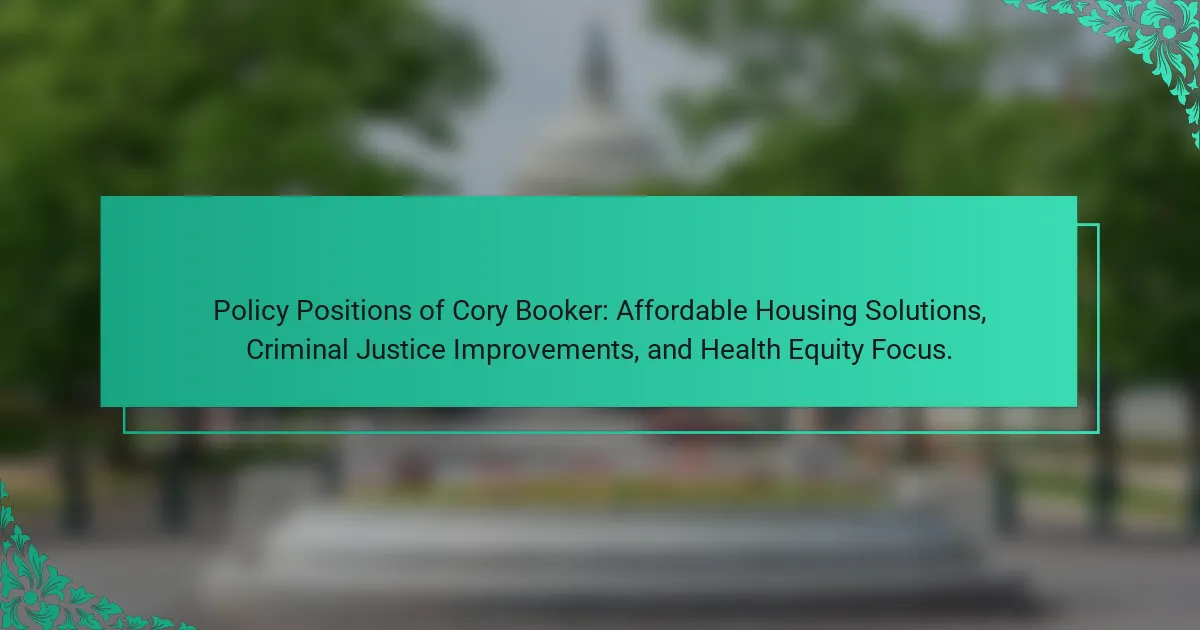Cory Booker is a prominent political figure known for his advocacy in three key policy areas: affordable housing, criminal justice reform, and health equity. He supports initiatives to enhance access to affordable housing through federal funding and assistance for low-income families. Booker’s criminal justice reform efforts focus on reducing mass incarceration and promoting rehabilitation for offenders. Additionally, his commitment to health equity aims to address disparities in healthcare access and outcomes for marginalized communities. These policy positions underscore his dedication to advancing social justice and economic opportunities for all.

What are the key policy positions of Cory Booker?
Cory Booker’s key policy positions include affordable housing, criminal justice reform, and health equity. He advocates for increasing access to affordable housing through federal funding and support for low-income families. Booker also emphasizes the need for comprehensive criminal justice reform, aiming to reduce mass incarceration and promote rehabilitation. His health equity focus seeks to address disparities in healthcare access and outcomes for marginalized communities. These positions reflect his commitment to social justice and economic opportunity.
How do these policy positions address affordable housing?
Cory Booker’s policy positions address affordable housing by advocating for increased funding and support for housing initiatives. He emphasizes the need for affordable housing development through federal investments. Booker supports policies that promote inclusionary zoning to ensure diverse communities. He also seeks to expand housing vouchers to assist low-income families. Additionally, he advocates for protections against housing discrimination. These measures aim to make housing accessible for all, particularly marginalized groups. Booker’s approach is based on the belief that stable housing is essential for economic mobility and community health.
What specific affordable housing solutions does Cory Booker propose?
Cory Booker proposes several specific affordable housing solutions. He advocates for increasing funding for the Housing Trust Fund. This fund supports the construction and rehabilitation of rental housing for extremely low-income families. Booker also supports expanding the Low-Income Housing Tax Credit. This expansion aims to incentivize the creation of affordable housing units. Additionally, he emphasizes the importance of inclusionary zoning policies. These policies require developers to include affordable units in new developments. Booker proposes investing in community land trusts as a means to promote affordable housing. He believes these trusts can help stabilize neighborhoods and keep housing affordable. Furthermore, he advocates for policies that prevent displacement of low-income residents. These solutions aim to address the affordable housing crisis effectively.
How do these solutions impact low-income communities?
Affordable housing solutions positively impact low-income communities by increasing access to stable living conditions. Stable housing reduces homelessness rates, which directly correlates with improved health outcomes. Additionally, affordable housing initiatives often lead to greater economic stability for families. Research shows that families in stable housing can allocate more resources towards education and health care. This, in turn, promotes overall community well-being and reduces reliance on social services. Criminal justice improvements aim to decrease incarceration rates, which disproportionately affect low-income communities. Reducing incarceration allows individuals to contribute economically and socially to their communities. Health equity initiatives work to address disparities in health care access, leading to better health outcomes for low-income populations. Overall, these solutions foster a more equitable environment for low-income communities.
What improvements does Cory Booker advocate for in criminal justice?
Cory Booker advocates for several improvements in criminal justice. He emphasizes the need for comprehensive criminal justice reform. This includes reducing mandatory minimum sentences for non-violent offenses. Booker supports the elimination of cash bail to prevent pretrial detention based on financial status. He also champions the use of restorative justice practices. These practices aim to rehabilitate offenders rather than solely punish them. Additionally, Booker calls for increased funding for mental health and addiction treatment programs. He believes these resources can help address the root causes of crime. His proposals aim to create a more equitable and effective justice system.
What are the main reforms suggested by Cory Booker for the criminal justice system?
Cory Booker suggests several main reforms for the criminal justice system. He advocates for ending mandatory minimum sentences for non-violent offenses. Booker supports eliminating cash bail to reduce pretrial detention. He emphasizes the need for police reform, including accountability measures. Booker also promotes the reinvestment in communities affected by crime. He calls for the decriminalization of marijuana at the federal level. Additionally, Booker seeks to address racial disparities in sentencing. These reforms aim to create a more equitable and fair justice system.
How do these reforms aim to reduce racial disparities in justice?
These reforms aim to reduce racial disparities in justice by implementing measures that promote fairness and accountability. They focus on eliminating biased policing practices and reducing mandatory minimum sentences. Additionally, the reforms emphasize community-based alternatives to incarceration. Evidence shows that such alternatives can decrease recidivism rates among minority populations. Furthermore, these reforms advocate for increased funding for public defenders. This ensures equitable legal representation for all individuals, regardless of race. Studies indicate that access to quality legal counsel significantly impacts case outcomes. Overall, these strategies are designed to create a more equitable justice system.
How does Cory Booker prioritize health equity in his policies?
Cory Booker prioritizes health equity in his policies by advocating for comprehensive healthcare access. He supports initiatives aimed at reducing health disparities among marginalized communities. Booker emphasizes funding for community health centers to improve local healthcare services. He also champions policies that address social determinants of health, such as housing and education. His legislative efforts include the Health Equity and Accountability Act, which seeks to eliminate health disparities. Additionally, Booker has highlighted the importance of mental health services in underserved areas. He believes that equitable healthcare is essential for overall community well-being.
What initiatives does Cory Booker support to promote health equity?
Cory Booker supports several initiatives to promote health equity. He advocates for increased funding for community health centers. These centers provide essential services to underserved populations. Booker emphasizes the importance of addressing social determinants of health. He supports policies that aim to reduce health disparities among racial and ethnic minorities. He also champions the Affordable Care Act to ensure broader access to healthcare. Additionally, Booker promotes mental health resources and substance abuse treatment programs. His initiatives aim to create a more equitable healthcare system for all Americans.
How do these initiatives address systemic health disparities?
These initiatives address systemic health disparities by promoting equitable access to healthcare and addressing social determinants of health. They focus on improving healthcare infrastructure in underserved communities. For example, expanding Medicaid eligibility increases access for low-income individuals. Additionally, initiatives aim to reduce environmental hazards that disproportionately affect marginalized populations. By implementing policies that support affordable housing, health education, and preventive care, they target root causes of health inequities. Research shows that these comprehensive approaches lead to better health outcomes and reduced disparities.
What connections exist between affordable housing, criminal justice, and health equity in Booker’s policies?
Cory Booker’s policies connect affordable housing, criminal justice, and health equity through a holistic approach to social issues. Affordable housing is essential for reducing homelessness and stabilizing communities. Stable housing contributes to lower crime rates, as individuals are less likely to engage in criminal activities when they have secure living conditions.
Booker emphasizes that equitable access to housing can improve health outcomes. Poor housing conditions often lead to health disparities, affecting vulnerable populations disproportionately. By advocating for affordable housing initiatives, Booker aims to address systemic inequities that impact both criminal justice and health.
His policies propose reforms in criminal justice that address the root causes of crime, such as poverty and lack of access to housing. This comprehensive strategy highlights the interconnectedness of these issues. For instance, studies show that stable housing can lead to reduced recidivism rates among formerly incarcerated individuals.
Booker’s focus on health equity also ties back to housing, as access to safe and affordable housing can mitigate health risks. His initiatives reflect an understanding that improving housing can lead to better health and lower crime, creating a more equitable society.
How do Cory Booker’s policy positions reflect broader social justice goals?
Cory Booker’s policy positions reflect broader social justice goals by prioritizing equity and access in various sectors. His support for affordable housing aims to reduce homelessness and improve living conditions for low-income families. This aligns with the goal of ensuring everyone has a safe place to live.
In criminal justice, Booker advocates for reforms that address systemic racism and reduce mass incarceration. He promotes policies like the elimination of mandatory minimum sentences and investing in community-based alternatives. These initiatives seek to create a fairer justice system.
Booker’s focus on health equity addresses disparities in healthcare access and outcomes. He champions policies that expand access to affordable healthcare, particularly for marginalized communities. This effort aims to ensure that all individuals receive the medical care they need.
Overall, his policy positions are designed to dismantle barriers faced by underrepresented groups. They reflect a commitment to creating a more just and equitable society for all.
What can citizens do to support Cory Booker’s policy initiatives?
Citizens can support Cory Booker’s policy initiatives by advocating for affordable housing, criminal justice reform, and health equity. They can engage with local representatives to express their support for these issues. Attending town hall meetings can help citizens voice their opinions directly. Citizens can also participate in community organizing efforts that align with Booker’s initiatives. Volunteering for organizations that promote these causes amplifies their impact. Additionally, citizens can educate themselves and others about the importance of these policies. Sharing information on social media raises awareness and encourages broader discussions. Supporting campaigns that align with these initiatives can further strengthen their effectiveness.
The main entity of the article is Cory Booker, a political figure known for his policy positions on affordable housing, criminal justice reform, and health equity. The article outlines Booker’s advocacy for increased federal funding for affordable housing, comprehensive criminal justice reforms aimed at reducing mass incarceration, and initiatives to address health disparities in marginalized communities. It details specific solutions he proposes, such as expanding housing vouchers and funding community health centers, while highlighting the interconnectedness of these issues and their impact on low-income populations. Additionally, the article discusses how citizens can support Booker’s initiatives to foster social justice and equity.
